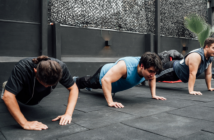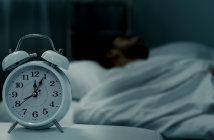We spend a third of our lives at work, so attempting adapt a healthy lifestyle requires us to incorporate changes at the workplace. This might seem like an insignificant step, but it can have a big impact on your life and you may inspire your coworkers to do the same.
Avoid Snacking
Many people bring candy and snacks to work and leave them out on a desk or table to share with others in the workplace. It’s better to avoid these areas as much as possible to reduce the likelihood of snacking on unhealthy choices. By reducing the temptation, you’re already taking one step towards eating healthier.
Avoid Midday Fatigue by Drinking Water
Many physicians agree that the lull people often feel between 1:00 and 3:00 p.m. is due to the dehydration that occurs throughout the day. When working in an office setting, it’s important to stay hydrated. Drink water throughout the day, ensuring you drink 8 to 10 glasses per day. Additionally, try eating fruits instead of unhealthy snacks. Apples, oranges, and watermelons are just a few fruits that provide a good source of hydration.
Take Every Opportunity to Walk
In most occupations; employees are stuck in a stationary position where they can’t just take off on a whim. Spend a portion of your lunch break going for a walk, this will reduce the likelihood of overeating on your lunch break, help you reduce stress and get some fresh air. You can also opt to take the stairs instead of the elevator and park at the farthest end of the parking lot.
Eat a Smart Lunch
Plant-based foods are easily digested and provide a variety of health benefits. However, it may be inconvenient to prepare vegetables for a lunch break. If you do deviate and opt for pizza or a burger, remember to think about portion size. In many cases, people gain weight from unhealthy foods primarily because they overeat. Limit yourself to one slice of pizza or fewer French fries with your burger.
Avoid Computer Eye Strain
Long hours of staring at a computer screen, tablet, or smartphone can lead to eye strain. Symptoms include vision changes, such as blurred vision or double vision, neck and back pain, and headaches. First, make sure you’re not sitting to close to your monitor. Vision experts recommend sitting at least one arm’s length from your monitor. If this makes it difficult to see the text on the screen, increase the size or style of the font. Additionally, take frequent breaks of 30 seconds or more to rest your eyes. Look at the horizon or some other distant point to exercise your vision.
Don’t Put off Your Vacation
There’s a reason employers provide us with vacation time, they recognize the importance of alleviating the stress that can build up from time to time. Left to fester, stress can cause physical illnesses by reducing the effectiveness of the immune system and increasing the chances that you’ll contract a disease or illness. Take a vacation and relax, you’ll return to work feeling recharged and renewed.
Be Wary of Germs and Bacteria
Some of the dirtiest surfaces we come into contact with are in the workplace. From your computer’s mouse and keyboard to phones, bacteria can live and thrive on surfaces for hours and even for several days. Disinfectant wipes or sprays can help you clean these surfaces and kill germs, limiting the chances of infection.
Avoid Sick Coworkers
In an ideal world, no one would go to work, when they’re feeling sick, but many people try to avoid missing work. Try to bypass communicating with a sick coworker as much as possible to limit the risk of contracting the illness. Wash your hands after being around anyone who is sick. While this may make you seem a little standoffish, it will also help you stay healthy. If the individual seems especially ill, consider asking your employer to send the individual home for the day.
Work Safely
Some people like to take on heavy projects and work on them until they’re completed, before taking a break. In addition to raising stress levels, this can create a feeling of burnout and may lead to costly mistakes. Working without breaks may increase the risk of having a serious workplace accident. Instead, take your scheduled breaks and unwind for a few minutes. You’ll return to work feeling refreshed and you may even work faster and smarter.
Watch Your Coffee Intake
Many people drink coffee throughout the day, opposed to those who just have one or two cups. If this is you, consider cutting back. The decrease in caffeine will help you sleep better at night and function better at work by reducing anxiety and nervousness. Additionally, if you add sugar and milk in your coffee, you can cut down on your calorie intake by reducing the amount of coffee you drink.
These are ways to work in a healthier and safer way. While we may be confined to a particular setting for 8 to 12 hours out of a day, that doesn’t mean we can’t pursue a healthier lifestyle in the workplace.








